2011届高考英语复习语法专项提升—动词时态和语态、冠词课件
文档属性
| 名称 | 2011届高考英语复习语法专项提升—动词时态和语态、冠词课件 |
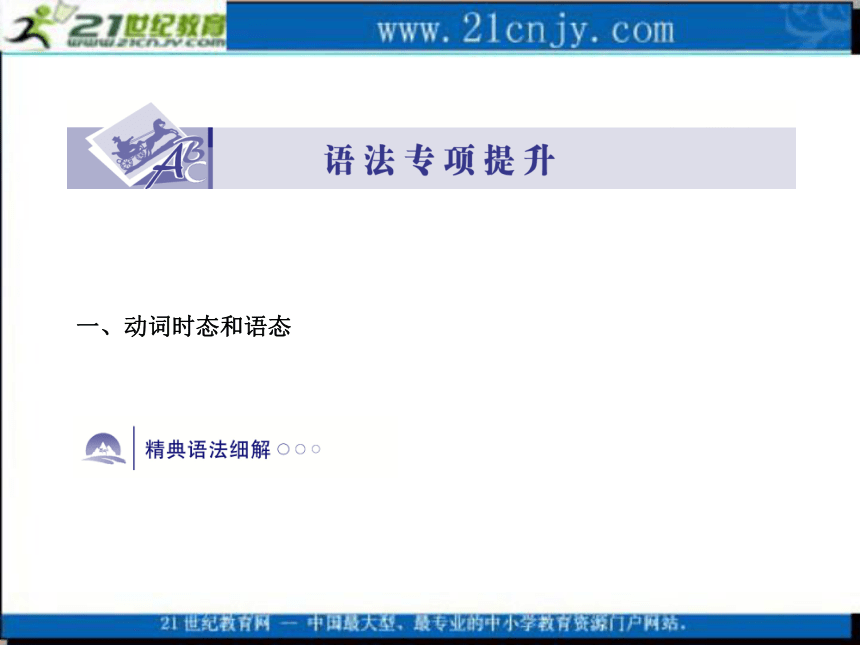
|
|
| 格式 | rar | ||
| 文件大小 | 223.0KB | ||
| 资源类型 | 教案 | ||
| 版本资源 | 通用版 | ||
| 科目 | 英语 | ||
| 更新时间 | 2010-10-04 00:00:00 | ||
图片预览

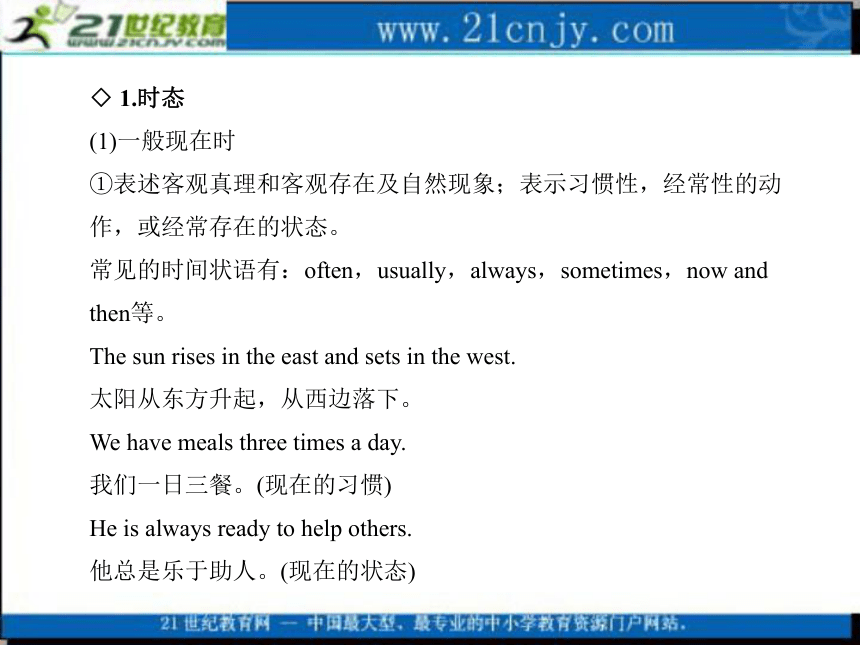
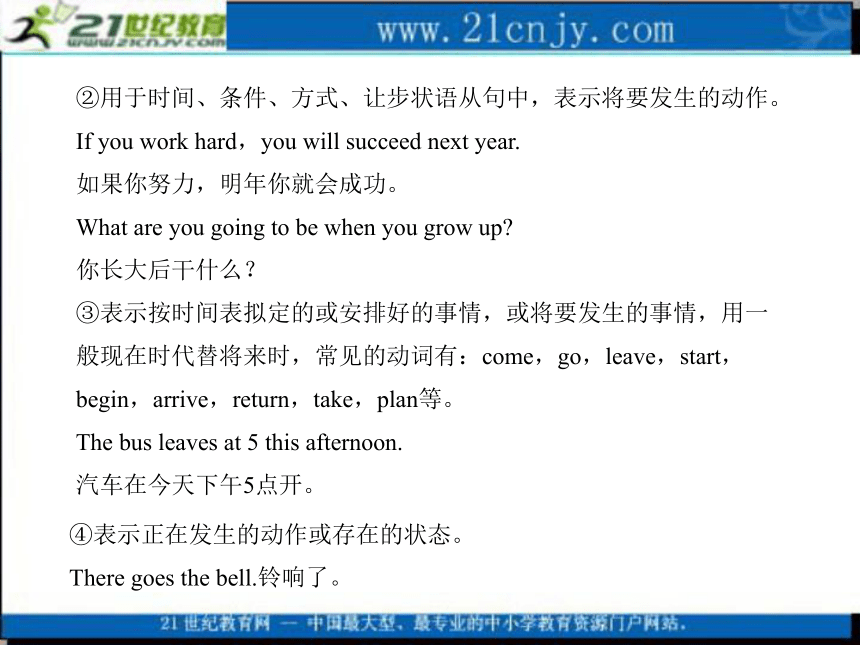
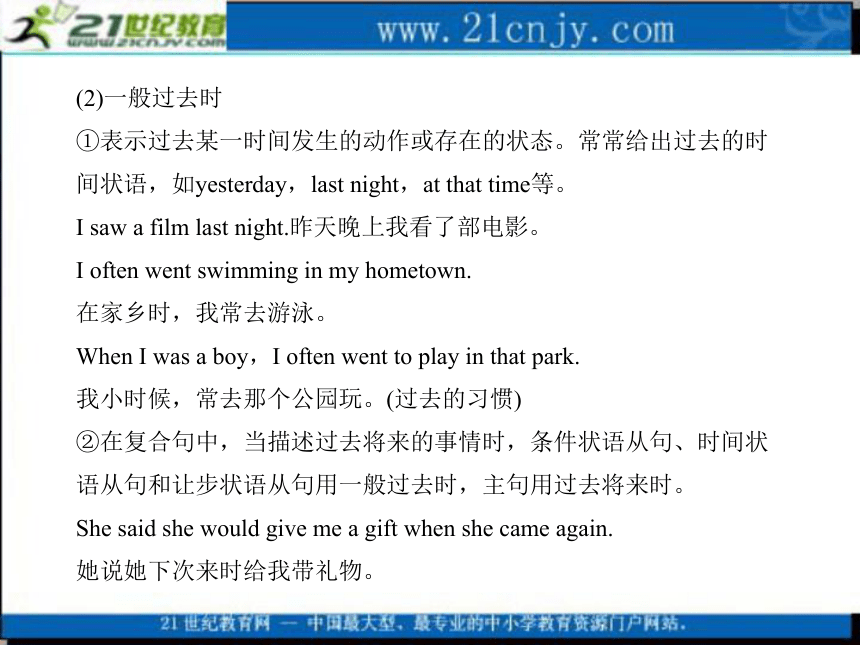
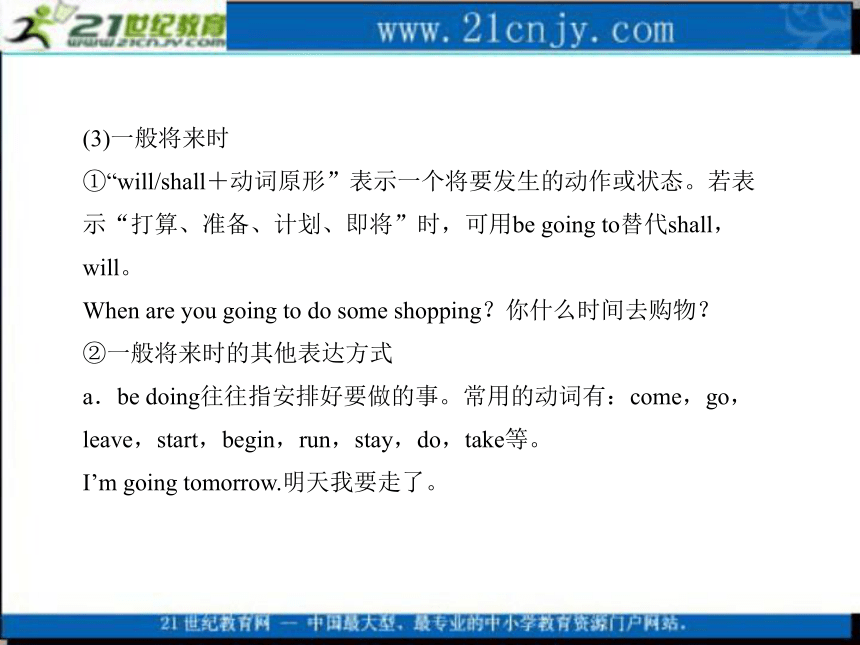
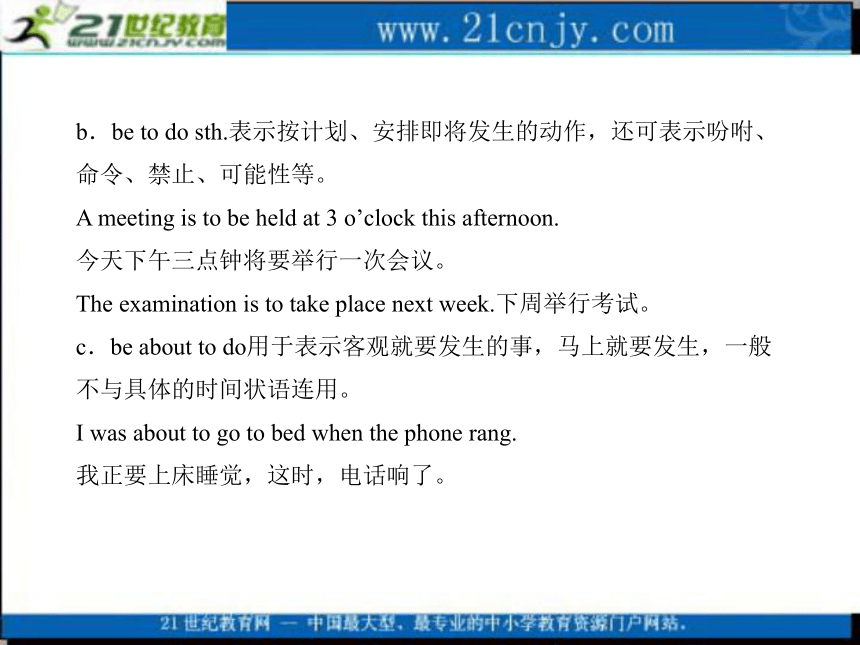
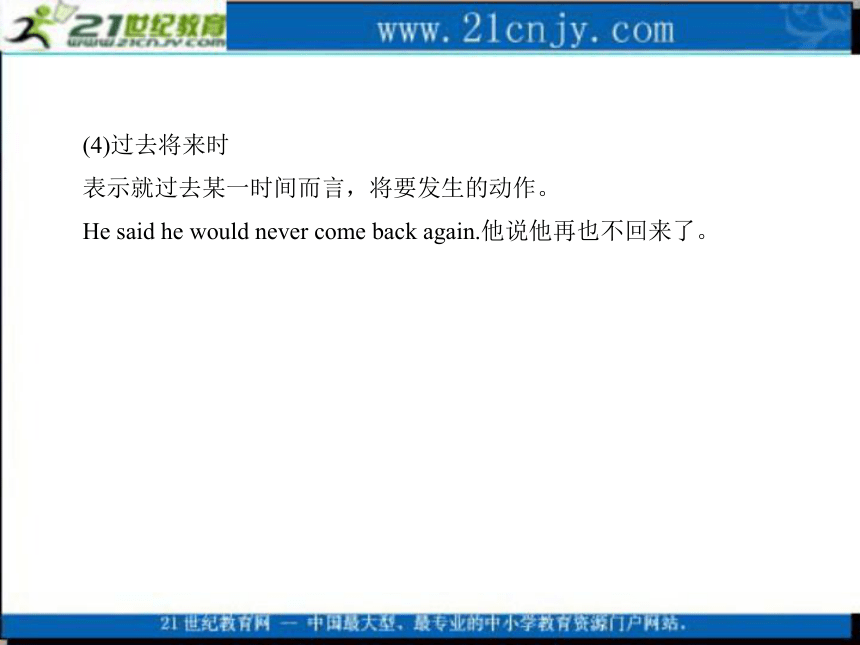
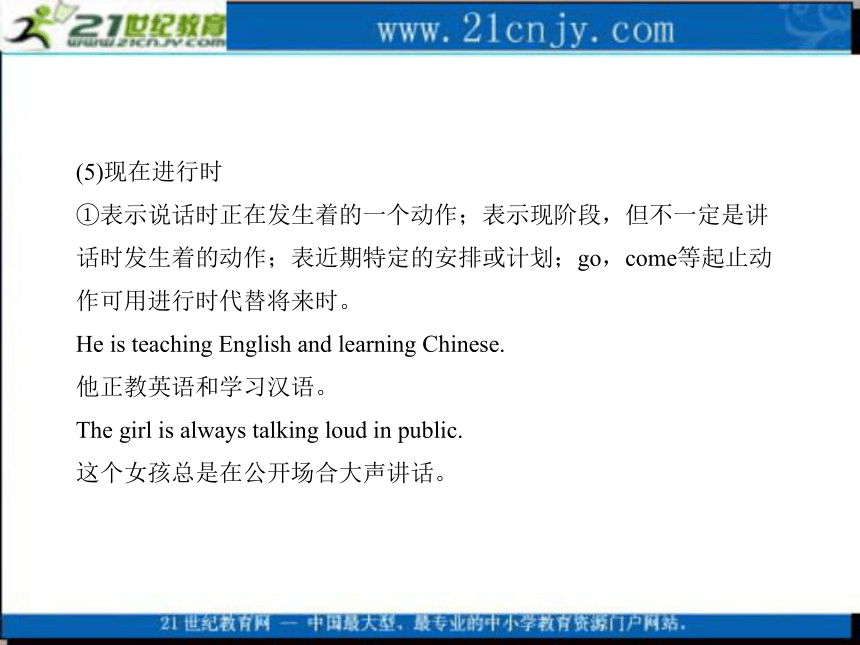
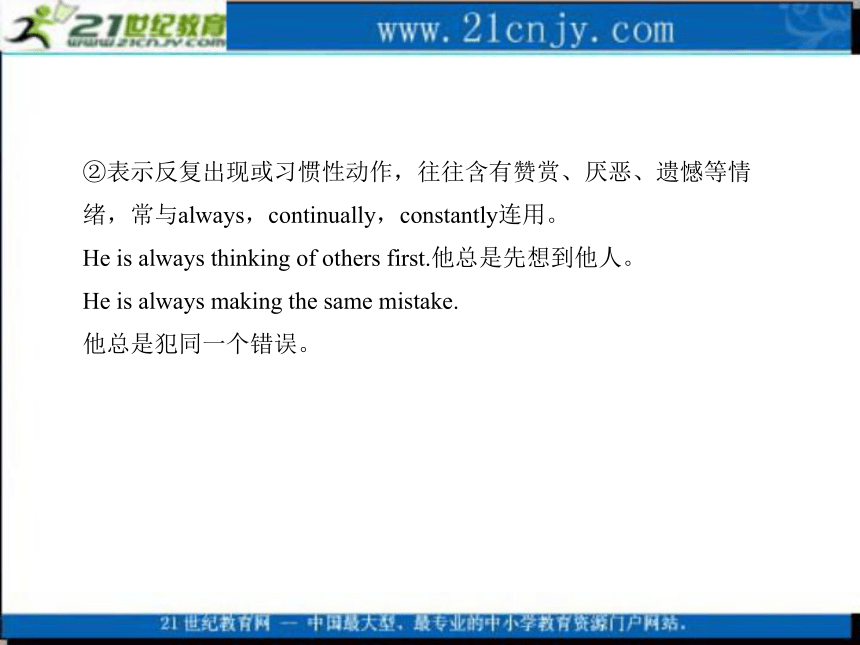
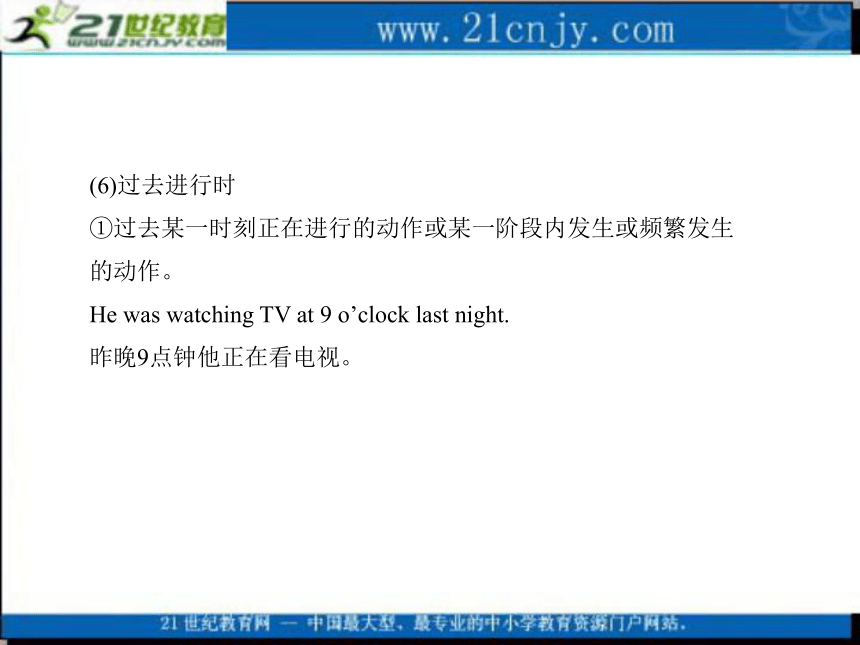
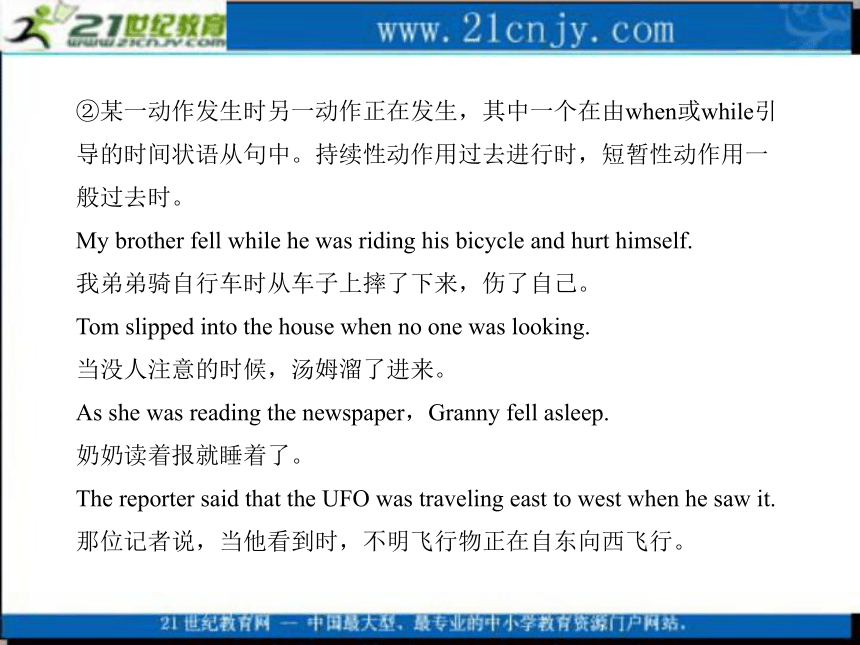

文档简介
课件66张PPT。一、动词时态和语态◇ 1.时态
(1)一般现在时
①表述客观真理和客观存在及自然现象;表示习惯性,经常性的动作,或经常存在的状态。
常见的时间状语有:often,usually,always,sometimes,now and then等。
The sun rises in the east and sets in the west.
太阳从东方升起,从西边落下。
We have meals three times a day.
我们一日三餐。(现在的习惯)
He is always ready to help others.
他总是乐于助人。(现在的状态)②用于时间、条件、方式、让步状语从句中,表示将要发生的动作。
If you work hard,you will succeed next year.
如果你努力,明年你就会成功。
What are you going to be when you grow up?
你长大后干什么?
③表示按时间表拟定的或安排好的事情,或将要发生的事情,用一般现在时代替将来时,常见的动词有:come,go,leave,start,begin,arrive,return,take,plan等。
The bus leaves at 5 this afternoon.
汽车在今天下午5点开。④表示正在发生的动作或存在的状态。
There goes the bell.铃响了。(2)一般过去时
①表示过去某一时间发生的动作或存在的状态。常常给出过去的时间状语,如yesterday,last night,at that time等。
I saw a film last night.昨天晚上我看了部电影。
I often went swimming in my hometown.
在家乡时,我常去游泳。
When I was a boy,I often went to play in that park.
我小时候,常去那个公园玩。(过去的习惯)
②在复合句中,当描述过去将来的事情时,条件状语从句、时间状语从句和让步状语从句用一般过去时,主句用过去将来时。
She said she would give me a gift when she came again.
她说她下次来时给我带礼物。(3)一般将来时
①“will/shall+动词原形”表示一个将要发生的动作或状态。若表示“打算、准备、计划、即将”时,可用be going to替代shall,will。
When are you going to do some shopping?你什么时间去购物?
②一般将来时的其他表达方式
a.be doing往往指安排好要做的事。常用的动词有:come,go,leave,start,begin,run,stay,do,take等。
I’m going tomorrow.明天我要走了。
b.be to do sth.表示按计划、安排即将发生的动作,还可表示吩咐、命令、禁止、可能性等。
A meeting is to be held at 3 o’clock this afternoon.
今天下午三点钟将要举行一次会议。
The examination is to take place next week.下周举行考试。
c.be about to do用于表示客观就要发生的事,马上就要发生,一般不与具体的时间状语连用。
I was about to go to bed when the phone rang.
我正要上床睡觉,这时,电话响了。(4)过去将来时
表示就过去某一时间而言,将要发生的动作。
He said he would never come back again.他说他再也不回来了。
(5)现在进行时
①表示说话时正在发生着的一个动作;表示现阶段,但不一定是讲话时发生着的动作;表近期特定的安排或计划;go,come等起止动作可用进行时代替将来时。
He is teaching English and learning Chinese.
他正教英语和学习汉语。
The girl is always talking loud in public.
这个女孩总是在公开场合大声讲话。
②表示反复出现或习惯性动作,往往含有赞赏、厌恶、遗憾等情绪,常与always,continually,constantly连用。
He is always thinking of others first.他总是先想到他人。
He is always making the same mistake.
他总是犯同一个错误。(6)过去进行时
①过去某一时刻正在进行的动作或某一阶段内发生或频繁发生的动作。
He was watching TV at 9 o’clock last night.
昨晚9点钟他正在看电视。②某一动作发生时另一动作正在发生,其中一个在由when或while引导的时间状语从句中。持续性动作用过去进行时,短暂性动作用一般过去时。
My brother fell while he was riding his bicycle and hurt himself.
我弟弟骑自行车时从车子上摔了下来,伤了自己。
Tom slipped into the house when no one was looking.
当没人注意的时候,汤姆溜了进来。
As she was reading the newspaper,Granny fell asleep.
奶奶读着报就睡着了。
The reporter said that the UFO was traveling east to west when he saw it.
那位记者说,当他看到时,不明飞行物正在自东向西飞行。(7)现在完成时
①表示过去所发生的动作或事情对现在的影响或产生的结果,着眼点在现在。通常与下列状语连用,如yet,just,before,lately,often,never,now,today等,但不能同特定的过去时间状语连用(如:in 1993,last year等)。
I’ve forgotten his telephone number.
我忘了他的电话号码了。
We’ve had too much rain this year.今年雨水太多。
②表示一个从过去某个时间开始,延续到现在,并可能延续下去的动作。常同表示一段时间的状语连用,如:so far,up to now,since,for the past (last) few years等。
He has worked here for over twenty years.
他在这里工作已有20多年了。
Up to now,we have received no news from her.
到现在,我们还没收到她的消息。③This/It is the first/second...time+that从句。that从句谓语要用现在完成时。
This is the first time I have come here.
这是我第一次来这里。
④在条件、时间、让步状语从句中,表示将来某时以前已完成的动作。
I will not believe you unless I have seen it with my own eyes.
只有我亲自看到,我才会相信你的话。(强调“看完”)
I will go with you as soon as I have finished my work.
我干完了工作就和你一起去。(强调“干完”)
(8)过去完成时
①过去完成时的动作表示过去某一时刻或某一动作之前完成的动作或已经存在的状态。句中常用by,before,until,when等词引导时间状语。
By the end of last year,we had built five new houses.
到去年末,我们已建了五座新房子。
I had learnt 5,000 words before I entered the university.
在我上大学前就学了5,000个单词。
②过去完成时的动词还可表示过去某一时刻之前发生的动作或状态持续到过去某个时间或继续持续下去。
Before he slept,he had worked for 12 hours.
他工作了12个小时才睡觉。③常用于下列情况
a.用在told,said,knew,heard,thought等动词后的宾语从句,表示动作发生在这些动词之前。
She said that she had never been to Paris.
她说她从未去过巴黎。
b.用在状语从句中,在过去不同时间发生的两个动作中,发生在先,用过去完成时;发生在后,用一般过去时。
When the police arrived,the thieves had run away.
警察到达时,小偷们早就跑了。
She had learned some English before she came to the institute.
她在来学院前已学过一些英语。
c.Hardly/Scarcely/Barely had...done...when...;No sooner had...done...than...。when和than从句里用一般过去时,表示“刚刚……就……”。
Hardly (No sooner) had I got home when (than) the rain poured down.我刚到家大雨就倾盆而下。
Hardly had we started when the car got a flat tyre.
我们才刚刚动身,汽车的轮胎就漏气了。
d.It was/had been+一段时间+since从句。since从句中谓语动词用过去完成时。
It was ten years since we had had such a wonderful time.
十年我们没这么高兴了。e.That/It was the first/second/...time+that从句。that从句谓语要用过去完成时。
It was the third time (that) he had made the same mistake.
这是他第三次犯同样的错误了。
That was the first time that I had passed the exam.
那是我第一次考试及格。f.表示愿望、打算一类的词,如:hope,expect,mean,intend,want,think,suppose等,其过去完成时表示过去未曾实现的愿望或意图。
I had hoped to see more of Shanghai.
我本希望在上海多看看。(但未能如愿)
I had meant to help you,but I was too busy at the moment.
我本想去帮你的,但当时确实太忙了。
I had thought you would come tomorrow.
我原以为你明天才来呢。(9)将来完成时
将来完成时表示到将来某一时间,某一动作将会完成,常用的时间状语为:by+将来的某个时间。
By this time of next year,all of you will have become college students.到明年的这个时候,你们大家就成了大学生了。(10)现在完成进行时
现在完成进行时表示一个动作开始于过去,并持续到现在,并强调现在还在进行。完成进行时是完成时和进行时的组合,因此,它具备完成时和进行时的一些因素,如:它具备进行时的“未完性、暂时性、感彩等” 的特点。
He has been learning English for 6 years.
(从过去某一时间开始学英语,强调到现在还在学)
It has been raining for 3 days.
(强调说话者“抱怨”的感彩)◇ 2.语态
语态包括主动语态和被动语态。
当句子的主语是动作的执行者时,谓语的形式用主动语态。当句子的主语是动作的承受者时,谓语动词的形式用被动语态。
被动语态构成方式为:be+过去分词,口语也有用get/become+过去分词表示的。
在被动语态的使用中,要注意下面几种情况:(1)由动词+介词或副词构成的短语动词
要把它们作为整体看,即把它们看成一个及物动词,介词或副词不可拆开或漏掉。
All these things must be answered for.所有这一切都是要偿还的。
He was always laughed at by others.他总是被人嘲笑。
(2)get+过去分词表被动
They got married last week.他们上周结婚了。
He fell and got hurt.他摔倒受伤了。
(3)主动形式表被动意义
①系动词look,feel,sound,smell,taste,seem,appear,go,prove,turn等+形容词/名词。
Ice feels cold.冰摸上去凉。
His plan proved (to be) practical.这项计划被证明符合实际。
Cotton feels soft.棉花摸上去软。
②表示开始、结束、运动的词:begin,finish,start,open,close,stop,shut等。
Class begins!开始上课。
Work began at 7 o’clock this morning.上午七点开始工作。
The shop closes at 6 p.m. every day.每天下午6点关店门。③表示主语的某种属性的词:read,write,act,cut,draw,drive,sell,wash,clean,wear,open,cook,lock,look,shut等。
The books sell well.这些书畅销。
The door won’t lock.门锁不上。
This coat dries easily.这种外衣容易干。
Food can keep fresh in a fridge.食物在冰箱里能保鲜。
Your speech reads well.你的演说讲得好。
This material has worn thin.这个材料已经磨薄了。
The match won’t catch.火柴擦不着。
The plan worked out wonderfully.这计划制定得很好。
The engine won’t start.引擎发动不起来。
The pen writes smoothly.这只钢笔写起来流利。二、冠 词◇ 1.不定冠词的用法
(1)表示“一个”,意为one;指某人或某物,意为a certain。
A Mr Li is waiting for you.一位李先生在等你。
We all regard him as a living Lei Feng.
我们都认为他是一位活雷锋。
A Mr Wang came to see you this morning.
今天早晨一位王先生来看望你。
(2)代表一类人或物。
A knife is a tool for cutting with.
刀子是用来切东西的一种工具。
Mr Smith is an engineer.史密斯先生是一位工程师。(3)不定冠词a(n)用于有或没有形容词修饰的抽象名词前。
Many people agreed that a knowledge of English is a must in international trade today.许多人都认为,在当前国际贸易交往中,英语知识是必备的。
(4)不定冠词a(n)用于有形容词修饰的一日三餐前。
Before I go to work every moring,I’ve a light breakfast.
我每天早晨上班前,吃点简单的早餐。(5)不定冠词a(n)用于序数词前,表示一次,又一。
How important it is to learn a second language!
再学一门语言是多么重要啊!
Can you give me a second chance,please?(another chance)
再给我一次机会好吗?
(6)不定冠词a(n)表示“per”的意思。
His income is one thousand yuan a month.
他的月收入是1,000元。
(7)不定冠词a(n)用于有good/great many修饰的名词复数前。
I’ve visited the Great Wall a good many times.
我参观过长城好多次。
(8)不定冠词a(n)用于形式为复数,但意义仍为单数的名词前。
A thousand miles is a good distance.
一千英里是相当远的距离。
(9)不定冠词a(n)用于一些原来是动词的名词前。
Let’s have a walk around the playground after supper!
晚饭后,让我们围着操场散步吧!(10)用在某些抽象名词前,表示“一种、一类、一份、一场、一阵……”等。
Longjing is a famous Chinese green tea.
龙井是一种著名的中国绿茶。
A heavy rain prevented them from going out.
一场大雨阻止了他们外出。
(11)一些表示情感的不可数名词,如feeling,honour,joy,pity,pleasure,surprise等,在表示一种心理情感时(前面多有一个描绘性的形容词),需要加不定冠词。
It’s a pleasure to talk with you.
和你谈话是一件愉快的事。
It’s a pity you can’t swim.真可惜你不会游泳。(12)不可数名词danger,difficulty,disappointment,failure,help,success,wonder等在表示一种人或物时,前面应加不定冠词。
He is a danger.他是一个危险的人。
His new book was a great success.
他的新书获得了巨大成功。
Oh,John. What a pleasant surprise you give us!
噢,约翰,你给了我们一个多么大的惊喜!◇ 2.定冠词的用法
(1) 特指双方都明白的人或物。
Take the medicine.把药吃了。
(2)指上文提到过的人或物。
He bought a house. I’ve been to the house.
他买了幢房子。我去过那幢房子。
(3)指世界上独一无二的事物。
the sun,the sky,the moon,the earth
(4)与单数名词连用表示一类事物。
The horse is a useful animal.马是一种有用的动物。(5)定冠词the和一个形容词连用,代表一类人。若其作主语,则其后的谓语动词用复数形式。
He fired me,but soon he was among the unemployed.
他解雇了我,但不久他也加入失业大军的行列。
The wounded were sent to the hospital immediately.
受伤者被立刻送往医院。
(6)用在序数词和形容词最高级及形容词only,very,same等前面。
—Where do you live?你住在哪?
—I live on the second floor.我住在二层。
That’s the very thing I’ve been looking for.
那正是我要找的东西。(7)用在姓氏复数形式前,表示一家人。
The Greens are at table.格林一家正在吃饭。
The Chens will move to Nanjing.
姓陈的一家要搬到南京去。
(8)表示所有,相当于物主代词,用在表示身体部位的名词前。
She caught me by the arm.她抓住了我的手臂。
(9)用在某些由普通名词构成的国家名称、机关、团体、阶级等专有名词前。
the People’s Republic of China中华人民共和国
the United States美国(10)用在年代、朝代、时代名词前。
the Tang dynasty唐朝
the Spring and Autumn Period 春秋时期
in the 1870’s 在19世纪70年代
(11)用在作为课程或演奏等的乐器名称前。
He plays the violin but gives lessons on the piano.
他是拉小提琴的,但是他教钢琴课。
但:We have a piano in our house.我们家有一架钢琴。(12)用在表示单位的名词前。
I have hired the car by the hour.我已按小时租车。
Eggs are sold by the dozen.鸡蛋论打卖。
by the day (month)按日(月)
by the yard (foot)按码(英尺)
但:by weight按重量◇ 3.零冠词的用法
(1)泛指的复数名词,表示一类人或事物时,可不用定冠词。
They are teachers.他们是教师。
(2)抽象名词表示一般概念时,通常不加冠词。
Failure is the mother of success.失败乃成功之母。
(3)物质名词表示一般概念时,通常不加冠词,当表示特定的意思时,需要加定冠词。
Man cannot live without water.人离开水就无法生存。
(4)在季节、月份、节日、假日、日期、星期等表示时间的名词之前,不加冠词。
We go to school from Monday to Friday.
我们从星期一到星期五都上课。
Spring follows winter.冬去春来。
We have no class on Saturday.星期六我们没课。(5)称呼语或表示头衔的名词(作表语、同位语、补足语)前。
Comrade Li was chairman of the meeting.李先生是大会主席。
We elected him monitor of our class.我们选举他为班长。
(6)表抽象意义或一般意义的时间名词前。
at daybreak;at sunrise;at sunset;at noon;at midday;at night;at midnight;before(after)dark;from dawn until dark;from morning till night
(7)表乘交通工具的短语中。
by bike;by car;by boat;by plane (air);by train;on foot (步行);on horseback
比较:on a bike;in a car;in(on)a(the)train(a carriage,a bus);on a(the)ship;take a bus;catch the train;ride in a bus
(8)单数可数名词前不用a(n)的情况
①连系动词turn后的单数可数名词作表语时。
After graduation from college he turned teacher(became a teacher).大学毕业后,他成了一名教师。
②Child as/though he is,he knows a lot.
但:Though he is a child,he knows a lot.
尽管他是个小孩,但懂得很多。③man意为“人类”,word意为“消息”时,其前不用冠词。
Air is to man what water is to fish.
人离不开空气就像鱼离不开水。
Word came that the Chinese Women Football Team won the second prize in World Cup.
消息传来说中国女子足球队在世界杯中获得了第二名。(9)当两个或两个以上名词并用时,常省去冠词。
I can’t write without pen or pencil.
没有钢笔和铅笔,我就写不了字。
◇ 4.有定冠词与无定冠词的区别
be in charge of负责……
be in the charge of由……负责;在……掌管之下
be of age成年
be of an age同龄
by day在白天
by the day按日计算
go to school去上学
go to the school到学校去
He is still in office.他仍在执政。
He is still in the office.他仍在办公室里。
in possession of拥有in the possession of 为……所有
in sight of能看见
in the sight of据……的见解
in place of代替
in the place of在……的地方
in hospital住院
in the hospital在医院里
in front of在……(以外的)前面
in the front of在……(里面的)前部
(It is)out of question.毫无疑问的
(相当于beyond question)
(It is)out of the question.根本不可能的
(相当于impossible)
sit at table吃饭
sit at the table坐在桌旁
three of us我们中的三个人
the three of us我们三个人
take advice征求意见
take the advice听从劝告
take place发生
take the place of代替
◇ 5.冠词的位置
冠词一般放在名词之前,名词之前若有形容词,冠词要放在形容词之前。但下列情况例外:
(1)用在quite,rather,many (more than),half,what,such等词之后。
I had never seen such a good match.
我从未看过这么激烈的比赛。
Many a person believes the story.许多人相信这个故事。(2)当某一单数名词前有形容词修饰,又有as,so,too,how 等词修饰形容词时,不定冠词应位于形容词之后。
It was so good a film that we all wanted to see it again.
这部电影如此之好,我们都想再看一次。
It’s too difficult a book for me.这本书对我来说太难了。
(3)rather 可位于冠词前或后。
a rather cold day=rather a cold day
(4)half 可位于冠词之前,也可位于冠词之后。
half an hour=a half hour
(5)all,both放在the之前。
all the books,both the boys二、冠 词◇ 1.不定冠词的用法
(1)表示“一个”,意为one;指某人或某物,意为a certain。
A Mr Li is waiting for you.一位李先生在等你。
We all regard him as a living Lei Feng.
我们都认为他是一位活雷锋。
A Mr Wang came to see you this morning.
今天早晨一位王先生来看望你。
(2)代表一类人或物。
A knife is a tool for cutting with.
刀子是用来切东西的一种工具。
Mr Smith is an engineer.史密斯先生是一位工程师。(3)不定冠词a(n)用于有或没有形容词修饰的抽象名词前。
Many people agreed that a knowledge of English is a must in international trade today.许多人都认为,在当前国际贸易交往中,英语知识是必备的。
(4)不定冠词a(n)用于有形容词修饰的一日三餐前。
Before I go to work every moring,I’ve a light breakfast.
我每天早晨上班前,吃点简单的早餐。
(5)不定冠词a(n)用于序数词前,表示一次,又一。
How important it is to learn a second language!
再学一门语言是多么重要啊!
Can you give me a second chance,please?(another chance)
再给我一次机会好吗?
(6)不定冠词a(n)表示“per”的意思。
His income is one thousand yuan a month.
他的月收入是1,000元。
(7)不定冠词a(n)用于有good/great many修饰的名词复数前。
I’ve visited the Great Wall a good many times.
我参观过长城好多次。
(8)不定冠词a(n)用于形式为复数,但意义仍为单数的名词前。
A thousand miles is a good distance.
一千英里是相当远的距离。(9)不定冠词a(n)用于一些原来是动词的名词前。
Let’s have a walk around the playground after supper!
晚饭后,让我们围着操场散步吧!
(10)用在某些抽象名词前,表示“一种、一类、一份、一场、一阵……”等。
Longjing is a famous Chinese green tea.
龙井是一种著名的中国绿茶。
A heavy rain prevented them from going out.
一场大雨阻止了他们外出。
(11)一些表示情感的不可数名词,如feeling,honour,joy,pity,pleasure,surprise等,在表示一种心理情感时(前面多有一个描绘性的形容词),需要加不定冠词。It’s a pleasure to talk with you.
和你谈话是一件愉快的事。
It’s a pity you can’t swim.真可惜你不会游泳。
(12)不可数名词danger,difficulty,disappointment,failure,help,success,wonder等在表示一种人或物时,前面应加不定冠词。
He is a danger.他是一个危险的人。
His new book was a great success.
他的新书获得了巨大成功。
Oh,John.What a pleasant surprise you give us!
噢,约翰,你给了我们一个多么大的惊喜!◇ 2.定冠词的用法
(1) 特指双方都明白的人或物。
Take the medicine.把药吃了。
(2)指上文提到过的人或物。
He bought a house.I’ve been to the house.
他买了幢房子。我去过那幢房子。
(3)指世界上独一无二的事物。
the sun,the sky,the moon,the earth
(4)与单数名词连用表示一类事物。
The horse is a useful animal.马是一种有用的动物。(5)定冠词the和一个形容词连用,代表一类人。若其作主语,则其后的谓语动词用复数形式。
He fired me,but soon he was among the unemployed.
他解雇了我,但不久他也加入失业大军的行列。
The wounded were sent to the hospital immediately.
受伤者被立刻送往医院。
(6)用在序数词和形容词最高级及形容词only,very,same等前面。
—Where do you live?你住在哪?
—I live on the second floor.我住在二层。
That’s the very thing I’ve been looking for.
那正是我要找的东西。(7)用在姓氏复数形式前,表示一家人。
The Greens are at table.格林一家正在吃饭。
The Chens will move to Nanjing.
姓陈的一家要搬到南京去。
(8)表示所有,相当于物主代词,用在表示身体部位的名词前。
She caught me by the arm.她抓住了我的手臂。
(9)用在某些由普通名词构成的国家名称、机关、团体、阶级等专有名词前。
the People’s Republic of China中华人民共和国
the United States美国
(10)用在年代、朝代、时代名词前。
the Tang dynasty唐朝
the Spring and Autumn Period 春秋时期
in the 1870’s 在19世纪70年代
(11)用在作为课程或演奏等的乐器名称前。
He plays the violin but gives lessons on the piano.
他是拉小提琴的,但是他教钢琴课。
但:We have a piano in our house.我们家有一架钢琴。
(12)用在表示单位的名词前。
I have hired the car by the hour.我已按小时租车。
Eggs are sold by the dozen.鸡蛋论打卖。
by the day (month)按日(月)
by the yard (foot)按码(英尺)
但:by weight按重量◇ 3.零冠词的用法
(1)泛指的复数名词,表示一类人或事物时,可不用定冠词。
They are teachers.他们是教师。
(2)抽象名词表示一般概念时,通常不加冠词。
Failure is the mother of success.失败乃成功之母。
(3)物质名词表示一般概念时,通常不加冠词,当表示特定的意思时,需要加定冠词。
Man cannot live without water.人离开水就无法生存。
(4)在季节、月份、节日、假日、日期、星期等表示时间的名词之前,不加冠词。
We go to school from Monday to Friday.
我们从星期一到星期五都上课。
Spring follows winter.冬去春来。
We have no class on Saturday.星期六我们没课。
(5)称呼语或表示头衔的名词(作表语、同位语、补足语)前。
Comrade Li was chairman of the meeting.李先生是大会主席。
We elected him monitor of our class.我们选举他为班长。
(6)表抽象意义或一般意义的时间名词前。
at daybreak;at sunrise;at sunset;at noon;at midday;at night;at midnight;before(after)dark;from dawn until dark;from morning till night
(7)表乘交通工具的短语中。
by bike;by car;by boat;by plane (air);by train;on foot (步行);on horseback
比较:on a bike;in a car;in(on)a(the)train(a carriage,a bus);on a(the)ship;take a bus;catch the train;ride in a bus
(8)单数可数名词前不用a(n)的情况
①连系动词turn后的单数可数名词作表语时。
After graduation from college he turned teacher(became a teacher).大学毕业后,他成了一名教师。②Child as/though he is,he knows a lot.
但:Though he is a child,he knows a lot.
尽管他是个小孩,但懂得很多。
③man意为“人类”,word意为“消息”时,其前不用冠词。
Air is to man what water is to fish.
人离不开空气就像鱼离不开水。
Word came that the Chinese Women Football Team won the second prize in World Cup.
消息传来说中国女子足球队在世界杯中获得了第二名。
(9)当两个或两个以上名词并用时,常省去冠词。
I can’t write without pen or pencil.
没有钢笔和铅笔,我就写不了字。◇ 4.有定冠词与无定冠词的区别
be in charge of负责……
be in the charge of由……负责;在……掌管之下
be of age成年
be of an age同龄
by day在白天
by the day按日计算
go to school去上学
go to the school到学校去
He is still in office.他仍在执政。
He is still in the office.他仍在办公室里。in possession of拥有
in the possession of 为……所有
in sight of能看见
in the sight of据……的见解
in place of代替
in the place of在……的地方
in hospital住院
in the hospital在医院里
in front of在……(以外的)前面
in the front of在……(里面的)前部
(It is)out of question.毫无疑问的
(相当于beyond question)(It is)out of the question.根本不可能的
(相当于impossible)
sit at table吃饭
sit at the table坐在桌旁
three of us我们中的三个人
the three of us我们三个人
take advice征求意见
take the advice听从劝告
take place发生
take the place of代替◇ 5.冠词的位置
冠词一般放在名词之前,名词之前若有形容词,冠词要放在形容词之前。但下列情况例外:
(1)用在quite,rather,many (more than),half,what,such等词之后。
I had never seen such a good match.
我从未看过这么激烈的比赛。
Many a person believes the story.许多人相信这个故事。
(2)当某一单数名词前有形容词修饰,又有as,so,too,how 等词修饰形容词时,不定冠词应位于形容词之后。It was so good a film that we all wanted to see it again.
这部电影如此之好,我们都想再看一次。
It’s too difficult a book for me.这本书对我来说太难了。
(3)rather 可位于冠词前或后。
a rather cold day=rather a cold day
(4)half 可位于冠词之前,也可位于冠词之后。
half an hour=a half hour
(5)all,both放在the之前。
all the books,both the boys
(1)一般现在时
①表述客观真理和客观存在及自然现象;表示习惯性,经常性的动作,或经常存在的状态。
常见的时间状语有:often,usually,always,sometimes,now and then等。
The sun rises in the east and sets in the west.
太阳从东方升起,从西边落下。
We have meals three times a day.
我们一日三餐。(现在的习惯)
He is always ready to help others.
他总是乐于助人。(现在的状态)②用于时间、条件、方式、让步状语从句中,表示将要发生的动作。
If you work hard,you will succeed next year.
如果你努力,明年你就会成功。
What are you going to be when you grow up?
你长大后干什么?
③表示按时间表拟定的或安排好的事情,或将要发生的事情,用一般现在时代替将来时,常见的动词有:come,go,leave,start,begin,arrive,return,take,plan等。
The bus leaves at 5 this afternoon.
汽车在今天下午5点开。④表示正在发生的动作或存在的状态。
There goes the bell.铃响了。(2)一般过去时
①表示过去某一时间发生的动作或存在的状态。常常给出过去的时间状语,如yesterday,last night,at that time等。
I saw a film last night.昨天晚上我看了部电影。
I often went swimming in my hometown.
在家乡时,我常去游泳。
When I was a boy,I often went to play in that park.
我小时候,常去那个公园玩。(过去的习惯)
②在复合句中,当描述过去将来的事情时,条件状语从句、时间状语从句和让步状语从句用一般过去时,主句用过去将来时。
She said she would give me a gift when she came again.
她说她下次来时给我带礼物。(3)一般将来时
①“will/shall+动词原形”表示一个将要发生的动作或状态。若表示“打算、准备、计划、即将”时,可用be going to替代shall,will。
When are you going to do some shopping?你什么时间去购物?
②一般将来时的其他表达方式
a.be doing往往指安排好要做的事。常用的动词有:come,go,leave,start,begin,run,stay,do,take等。
I’m going tomorrow.明天我要走了。
b.be to do sth.表示按计划、安排即将发生的动作,还可表示吩咐、命令、禁止、可能性等。
A meeting is to be held at 3 o’clock this afternoon.
今天下午三点钟将要举行一次会议。
The examination is to take place next week.下周举行考试。
c.be about to do用于表示客观就要发生的事,马上就要发生,一般不与具体的时间状语连用。
I was about to go to bed when the phone rang.
我正要上床睡觉,这时,电话响了。(4)过去将来时
表示就过去某一时间而言,将要发生的动作。
He said he would never come back again.他说他再也不回来了。
(5)现在进行时
①表示说话时正在发生着的一个动作;表示现阶段,但不一定是讲话时发生着的动作;表近期特定的安排或计划;go,come等起止动作可用进行时代替将来时。
He is teaching English and learning Chinese.
他正教英语和学习汉语。
The girl is always talking loud in public.
这个女孩总是在公开场合大声讲话。
②表示反复出现或习惯性动作,往往含有赞赏、厌恶、遗憾等情绪,常与always,continually,constantly连用。
He is always thinking of others first.他总是先想到他人。
He is always making the same mistake.
他总是犯同一个错误。(6)过去进行时
①过去某一时刻正在进行的动作或某一阶段内发生或频繁发生的动作。
He was watching TV at 9 o’clock last night.
昨晚9点钟他正在看电视。②某一动作发生时另一动作正在发生,其中一个在由when或while引导的时间状语从句中。持续性动作用过去进行时,短暂性动作用一般过去时。
My brother fell while he was riding his bicycle and hurt himself.
我弟弟骑自行车时从车子上摔了下来,伤了自己。
Tom slipped into the house when no one was looking.
当没人注意的时候,汤姆溜了进来。
As she was reading the newspaper,Granny fell asleep.
奶奶读着报就睡着了。
The reporter said that the UFO was traveling east to west when he saw it.
那位记者说,当他看到时,不明飞行物正在自东向西飞行。(7)现在完成时
①表示过去所发生的动作或事情对现在的影响或产生的结果,着眼点在现在。通常与下列状语连用,如yet,just,before,lately,often,never,now,today等,但不能同特定的过去时间状语连用(如:in 1993,last year等)。
I’ve forgotten his telephone number.
我忘了他的电话号码了。
We’ve had too much rain this year.今年雨水太多。
②表示一个从过去某个时间开始,延续到现在,并可能延续下去的动作。常同表示一段时间的状语连用,如:so far,up to now,since,for the past (last) few years等。
He has worked here for over twenty years.
他在这里工作已有20多年了。
Up to now,we have received no news from her.
到现在,我们还没收到她的消息。③This/It is the first/second...time+that从句。that从句谓语要用现在完成时。
This is the first time I have come here.
这是我第一次来这里。
④在条件、时间、让步状语从句中,表示将来某时以前已完成的动作。
I will not believe you unless I have seen it with my own eyes.
只有我亲自看到,我才会相信你的话。(强调“看完”)
I will go with you as soon as I have finished my work.
我干完了工作就和你一起去。(强调“干完”)
(8)过去完成时
①过去完成时的动作表示过去某一时刻或某一动作之前完成的动作或已经存在的状态。句中常用by,before,until,when等词引导时间状语。
By the end of last year,we had built five new houses.
到去年末,我们已建了五座新房子。
I had learnt 5,000 words before I entered the university.
在我上大学前就学了5,000个单词。
②过去完成时的动词还可表示过去某一时刻之前发生的动作或状态持续到过去某个时间或继续持续下去。
Before he slept,he had worked for 12 hours.
他工作了12个小时才睡觉。③常用于下列情况
a.用在told,said,knew,heard,thought等动词后的宾语从句,表示动作发生在这些动词之前。
She said that she had never been to Paris.
她说她从未去过巴黎。
b.用在状语从句中,在过去不同时间发生的两个动作中,发生在先,用过去完成时;发生在后,用一般过去时。
When the police arrived,the thieves had run away.
警察到达时,小偷们早就跑了。
She had learned some English before she came to the institute.
她在来学院前已学过一些英语。
c.Hardly/Scarcely/Barely had...done...when...;No sooner had...done...than...。when和than从句里用一般过去时,表示“刚刚……就……”。
Hardly (No sooner) had I got home when (than) the rain poured down.我刚到家大雨就倾盆而下。
Hardly had we started when the car got a flat tyre.
我们才刚刚动身,汽车的轮胎就漏气了。
d.It was/had been+一段时间+since从句。since从句中谓语动词用过去完成时。
It was ten years since we had had such a wonderful time.
十年我们没这么高兴了。e.That/It was the first/second/...time+that从句。that从句谓语要用过去完成时。
It was the third time (that) he had made the same mistake.
这是他第三次犯同样的错误了。
That was the first time that I had passed the exam.
那是我第一次考试及格。f.表示愿望、打算一类的词,如:hope,expect,mean,intend,want,think,suppose等,其过去完成时表示过去未曾实现的愿望或意图。
I had hoped to see more of Shanghai.
我本希望在上海多看看。(但未能如愿)
I had meant to help you,but I was too busy at the moment.
我本想去帮你的,但当时确实太忙了。
I had thought you would come tomorrow.
我原以为你明天才来呢。(9)将来完成时
将来完成时表示到将来某一时间,某一动作将会完成,常用的时间状语为:by+将来的某个时间。
By this time of next year,all of you will have become college students.到明年的这个时候,你们大家就成了大学生了。(10)现在完成进行时
现在完成进行时表示一个动作开始于过去,并持续到现在,并强调现在还在进行。完成进行时是完成时和进行时的组合,因此,它具备完成时和进行时的一些因素,如:它具备进行时的“未完性、暂时性、感彩等” 的特点。
He has been learning English for 6 years.
(从过去某一时间开始学英语,强调到现在还在学)
It has been raining for 3 days.
(强调说话者“抱怨”的感彩)◇ 2.语态
语态包括主动语态和被动语态。
当句子的主语是动作的执行者时,谓语的形式用主动语态。当句子的主语是动作的承受者时,谓语动词的形式用被动语态。
被动语态构成方式为:be+过去分词,口语也有用get/become+过去分词表示的。
在被动语态的使用中,要注意下面几种情况:(1)由动词+介词或副词构成的短语动词
要把它们作为整体看,即把它们看成一个及物动词,介词或副词不可拆开或漏掉。
All these things must be answered for.所有这一切都是要偿还的。
He was always laughed at by others.他总是被人嘲笑。
(2)get+过去分词表被动
They got married last week.他们上周结婚了。
He fell and got hurt.他摔倒受伤了。
(3)主动形式表被动意义
①系动词look,feel,sound,smell,taste,seem,appear,go,prove,turn等+形容词/名词。
Ice feels cold.冰摸上去凉。
His plan proved (to be) practical.这项计划被证明符合实际。
Cotton feels soft.棉花摸上去软。
②表示开始、结束、运动的词:begin,finish,start,open,close,stop,shut等。
Class begins!开始上课。
Work began at 7 o’clock this morning.上午七点开始工作。
The shop closes at 6 p.m. every day.每天下午6点关店门。③表示主语的某种属性的词:read,write,act,cut,draw,drive,sell,wash,clean,wear,open,cook,lock,look,shut等。
The books sell well.这些书畅销。
The door won’t lock.门锁不上。
This coat dries easily.这种外衣容易干。
Food can keep fresh in a fridge.食物在冰箱里能保鲜。
Your speech reads well.你的演说讲得好。
This material has worn thin.这个材料已经磨薄了。
The match won’t catch.火柴擦不着。
The plan worked out wonderfully.这计划制定得很好。
The engine won’t start.引擎发动不起来。
The pen writes smoothly.这只钢笔写起来流利。二、冠 词◇ 1.不定冠词的用法
(1)表示“一个”,意为one;指某人或某物,意为a certain。
A Mr Li is waiting for you.一位李先生在等你。
We all regard him as a living Lei Feng.
我们都认为他是一位活雷锋。
A Mr Wang came to see you this morning.
今天早晨一位王先生来看望你。
(2)代表一类人或物。
A knife is a tool for cutting with.
刀子是用来切东西的一种工具。
Mr Smith is an engineer.史密斯先生是一位工程师。(3)不定冠词a(n)用于有或没有形容词修饰的抽象名词前。
Many people agreed that a knowledge of English is a must in international trade today.许多人都认为,在当前国际贸易交往中,英语知识是必备的。
(4)不定冠词a(n)用于有形容词修饰的一日三餐前。
Before I go to work every moring,I’ve a light breakfast.
我每天早晨上班前,吃点简单的早餐。(5)不定冠词a(n)用于序数词前,表示一次,又一。
How important it is to learn a second language!
再学一门语言是多么重要啊!
Can you give me a second chance,please?(another chance)
再给我一次机会好吗?
(6)不定冠词a(n)表示“per”的意思。
His income is one thousand yuan a month.
他的月收入是1,000元。
(7)不定冠词a(n)用于有good/great many修饰的名词复数前。
I’ve visited the Great Wall a good many times.
我参观过长城好多次。
(8)不定冠词a(n)用于形式为复数,但意义仍为单数的名词前。
A thousand miles is a good distance.
一千英里是相当远的距离。
(9)不定冠词a(n)用于一些原来是动词的名词前。
Let’s have a walk around the playground after supper!
晚饭后,让我们围着操场散步吧!(10)用在某些抽象名词前,表示“一种、一类、一份、一场、一阵……”等。
Longjing is a famous Chinese green tea.
龙井是一种著名的中国绿茶。
A heavy rain prevented them from going out.
一场大雨阻止了他们外出。
(11)一些表示情感的不可数名词,如feeling,honour,joy,pity,pleasure,surprise等,在表示一种心理情感时(前面多有一个描绘性的形容词),需要加不定冠词。
It’s a pleasure to talk with you.
和你谈话是一件愉快的事。
It’s a pity you can’t swim.真可惜你不会游泳。(12)不可数名词danger,difficulty,disappointment,failure,help,success,wonder等在表示一种人或物时,前面应加不定冠词。
He is a danger.他是一个危险的人。
His new book was a great success.
他的新书获得了巨大成功。
Oh,John. What a pleasant surprise you give us!
噢,约翰,你给了我们一个多么大的惊喜!◇ 2.定冠词的用法
(1) 特指双方都明白的人或物。
Take the medicine.把药吃了。
(2)指上文提到过的人或物。
He bought a house. I’ve been to the house.
他买了幢房子。我去过那幢房子。
(3)指世界上独一无二的事物。
the sun,the sky,the moon,the earth
(4)与单数名词连用表示一类事物。
The horse is a useful animal.马是一种有用的动物。(5)定冠词the和一个形容词连用,代表一类人。若其作主语,则其后的谓语动词用复数形式。
He fired me,but soon he was among the unemployed.
他解雇了我,但不久他也加入失业大军的行列。
The wounded were sent to the hospital immediately.
受伤者被立刻送往医院。
(6)用在序数词和形容词最高级及形容词only,very,same等前面。
—Where do you live?你住在哪?
—I live on the second floor.我住在二层。
That’s the very thing I’ve been looking for.
那正是我要找的东西。(7)用在姓氏复数形式前,表示一家人。
The Greens are at table.格林一家正在吃饭。
The Chens will move to Nanjing.
姓陈的一家要搬到南京去。
(8)表示所有,相当于物主代词,用在表示身体部位的名词前。
She caught me by the arm.她抓住了我的手臂。
(9)用在某些由普通名词构成的国家名称、机关、团体、阶级等专有名词前。
the People’s Republic of China中华人民共和国
the United States美国(10)用在年代、朝代、时代名词前。
the Tang dynasty唐朝
the Spring and Autumn Period 春秋时期
in the 1870’s 在19世纪70年代
(11)用在作为课程或演奏等的乐器名称前。
He plays the violin but gives lessons on the piano.
他是拉小提琴的,但是他教钢琴课。
但:We have a piano in our house.我们家有一架钢琴。(12)用在表示单位的名词前。
I have hired the car by the hour.我已按小时租车。
Eggs are sold by the dozen.鸡蛋论打卖。
by the day (month)按日(月)
by the yard (foot)按码(英尺)
但:by weight按重量◇ 3.零冠词的用法
(1)泛指的复数名词,表示一类人或事物时,可不用定冠词。
They are teachers.他们是教师。
(2)抽象名词表示一般概念时,通常不加冠词。
Failure is the mother of success.失败乃成功之母。
(3)物质名词表示一般概念时,通常不加冠词,当表示特定的意思时,需要加定冠词。
Man cannot live without water.人离开水就无法生存。
(4)在季节、月份、节日、假日、日期、星期等表示时间的名词之前,不加冠词。
We go to school from Monday to Friday.
我们从星期一到星期五都上课。
Spring follows winter.冬去春来。
We have no class on Saturday.星期六我们没课。(5)称呼语或表示头衔的名词(作表语、同位语、补足语)前。
Comrade Li was chairman of the meeting.李先生是大会主席。
We elected him monitor of our class.我们选举他为班长。
(6)表抽象意义或一般意义的时间名词前。
at daybreak;at sunrise;at sunset;at noon;at midday;at night;at midnight;before(after)dark;from dawn until dark;from morning till night
(7)表乘交通工具的短语中。
by bike;by car;by boat;by plane (air);by train;on foot (步行);on horseback
比较:on a bike;in a car;in(on)a(the)train(a carriage,a bus);on a(the)ship;take a bus;catch the train;ride in a bus
(8)单数可数名词前不用a(n)的情况
①连系动词turn后的单数可数名词作表语时。
After graduation from college he turned teacher(became a teacher).大学毕业后,他成了一名教师。
②Child as/though he is,he knows a lot.
但:Though he is a child,he knows a lot.
尽管他是个小孩,但懂得很多。③man意为“人类”,word意为“消息”时,其前不用冠词。
Air is to man what water is to fish.
人离不开空气就像鱼离不开水。
Word came that the Chinese Women Football Team won the second prize in World Cup.
消息传来说中国女子足球队在世界杯中获得了第二名。(9)当两个或两个以上名词并用时,常省去冠词。
I can’t write without pen or pencil.
没有钢笔和铅笔,我就写不了字。
◇ 4.有定冠词与无定冠词的区别
be in charge of负责……
be in the charge of由……负责;在……掌管之下
be of age成年
be of an age同龄
by day在白天
by the day按日计算
go to school去上学
go to the school到学校去
He is still in office.他仍在执政。
He is still in the office.他仍在办公室里。
in possession of拥有in the possession of 为……所有
in sight of能看见
in the sight of据……的见解
in place of代替
in the place of在……的地方
in hospital住院
in the hospital在医院里
in front of在……(以外的)前面
in the front of在……(里面的)前部
(It is)out of question.毫无疑问的
(相当于beyond question)
(It is)out of the question.根本不可能的
(相当于impossible)
sit at table吃饭
sit at the table坐在桌旁
three of us我们中的三个人
the three of us我们三个人
take advice征求意见
take the advice听从劝告
take place发生
take the place of代替
◇ 5.冠词的位置
冠词一般放在名词之前,名词之前若有形容词,冠词要放在形容词之前。但下列情况例外:
(1)用在quite,rather,many (more than),half,what,such等词之后。
I had never seen such a good match.
我从未看过这么激烈的比赛。
Many a person believes the story.许多人相信这个故事。(2)当某一单数名词前有形容词修饰,又有as,so,too,how 等词修饰形容词时,不定冠词应位于形容词之后。
It was so good a film that we all wanted to see it again.
这部电影如此之好,我们都想再看一次。
It’s too difficult a book for me.这本书对我来说太难了。
(3)rather 可位于冠词前或后。
a rather cold day=rather a cold day
(4)half 可位于冠词之前,也可位于冠词之后。
half an hour=a half hour
(5)all,both放在the之前。
all the books,both the boys二、冠 词◇ 1.不定冠词的用法
(1)表示“一个”,意为one;指某人或某物,意为a certain。
A Mr Li is waiting for you.一位李先生在等你。
We all regard him as a living Lei Feng.
我们都认为他是一位活雷锋。
A Mr Wang came to see you this morning.
今天早晨一位王先生来看望你。
(2)代表一类人或物。
A knife is a tool for cutting with.
刀子是用来切东西的一种工具。
Mr Smith is an engineer.史密斯先生是一位工程师。(3)不定冠词a(n)用于有或没有形容词修饰的抽象名词前。
Many people agreed that a knowledge of English is a must in international trade today.许多人都认为,在当前国际贸易交往中,英语知识是必备的。
(4)不定冠词a(n)用于有形容词修饰的一日三餐前。
Before I go to work every moring,I’ve a light breakfast.
我每天早晨上班前,吃点简单的早餐。
(5)不定冠词a(n)用于序数词前,表示一次,又一。
How important it is to learn a second language!
再学一门语言是多么重要啊!
Can you give me a second chance,please?(another chance)
再给我一次机会好吗?
(6)不定冠词a(n)表示“per”的意思。
His income is one thousand yuan a month.
他的月收入是1,000元。
(7)不定冠词a(n)用于有good/great many修饰的名词复数前。
I’ve visited the Great Wall a good many times.
我参观过长城好多次。
(8)不定冠词a(n)用于形式为复数,但意义仍为单数的名词前。
A thousand miles is a good distance.
一千英里是相当远的距离。(9)不定冠词a(n)用于一些原来是动词的名词前。
Let’s have a walk around the playground after supper!
晚饭后,让我们围着操场散步吧!
(10)用在某些抽象名词前,表示“一种、一类、一份、一场、一阵……”等。
Longjing is a famous Chinese green tea.
龙井是一种著名的中国绿茶。
A heavy rain prevented them from going out.
一场大雨阻止了他们外出。
(11)一些表示情感的不可数名词,如feeling,honour,joy,pity,pleasure,surprise等,在表示一种心理情感时(前面多有一个描绘性的形容词),需要加不定冠词。It’s a pleasure to talk with you.
和你谈话是一件愉快的事。
It’s a pity you can’t swim.真可惜你不会游泳。
(12)不可数名词danger,difficulty,disappointment,failure,help,success,wonder等在表示一种人或物时,前面应加不定冠词。
He is a danger.他是一个危险的人。
His new book was a great success.
他的新书获得了巨大成功。
Oh,John.What a pleasant surprise you give us!
噢,约翰,你给了我们一个多么大的惊喜!◇ 2.定冠词的用法
(1) 特指双方都明白的人或物。
Take the medicine.把药吃了。
(2)指上文提到过的人或物。
He bought a house.I’ve been to the house.
他买了幢房子。我去过那幢房子。
(3)指世界上独一无二的事物。
the sun,the sky,the moon,the earth
(4)与单数名词连用表示一类事物。
The horse is a useful animal.马是一种有用的动物。(5)定冠词the和一个形容词连用,代表一类人。若其作主语,则其后的谓语动词用复数形式。
He fired me,but soon he was among the unemployed.
他解雇了我,但不久他也加入失业大军的行列。
The wounded were sent to the hospital immediately.
受伤者被立刻送往医院。
(6)用在序数词和形容词最高级及形容词only,very,same等前面。
—Where do you live?你住在哪?
—I live on the second floor.我住在二层。
That’s the very thing I’ve been looking for.
那正是我要找的东西。(7)用在姓氏复数形式前,表示一家人。
The Greens are at table.格林一家正在吃饭。
The Chens will move to Nanjing.
姓陈的一家要搬到南京去。
(8)表示所有,相当于物主代词,用在表示身体部位的名词前。
She caught me by the arm.她抓住了我的手臂。
(9)用在某些由普通名词构成的国家名称、机关、团体、阶级等专有名词前。
the People’s Republic of China中华人民共和国
the United States美国
(10)用在年代、朝代、时代名词前。
the Tang dynasty唐朝
the Spring and Autumn Period 春秋时期
in the 1870’s 在19世纪70年代
(11)用在作为课程或演奏等的乐器名称前。
He plays the violin but gives lessons on the piano.
他是拉小提琴的,但是他教钢琴课。
但:We have a piano in our house.我们家有一架钢琴。
(12)用在表示单位的名词前。
I have hired the car by the hour.我已按小时租车。
Eggs are sold by the dozen.鸡蛋论打卖。
by the day (month)按日(月)
by the yard (foot)按码(英尺)
但:by weight按重量◇ 3.零冠词的用法
(1)泛指的复数名词,表示一类人或事物时,可不用定冠词。
They are teachers.他们是教师。
(2)抽象名词表示一般概念时,通常不加冠词。
Failure is the mother of success.失败乃成功之母。
(3)物质名词表示一般概念时,通常不加冠词,当表示特定的意思时,需要加定冠词。
Man cannot live without water.人离开水就无法生存。
(4)在季节、月份、节日、假日、日期、星期等表示时间的名词之前,不加冠词。
We go to school from Monday to Friday.
我们从星期一到星期五都上课。
Spring follows winter.冬去春来。
We have no class on Saturday.星期六我们没课。
(5)称呼语或表示头衔的名词(作表语、同位语、补足语)前。
Comrade Li was chairman of the meeting.李先生是大会主席。
We elected him monitor of our class.我们选举他为班长。
(6)表抽象意义或一般意义的时间名词前。
at daybreak;at sunrise;at sunset;at noon;at midday;at night;at midnight;before(after)dark;from dawn until dark;from morning till night
(7)表乘交通工具的短语中。
by bike;by car;by boat;by plane (air);by train;on foot (步行);on horseback
比较:on a bike;in a car;in(on)a(the)train(a carriage,a bus);on a(the)ship;take a bus;catch the train;ride in a bus
(8)单数可数名词前不用a(n)的情况
①连系动词turn后的单数可数名词作表语时。
After graduation from college he turned teacher(became a teacher).大学毕业后,他成了一名教师。②Child as/though he is,he knows a lot.
但:Though he is a child,he knows a lot.
尽管他是个小孩,但懂得很多。
③man意为“人类”,word意为“消息”时,其前不用冠词。
Air is to man what water is to fish.
人离不开空气就像鱼离不开水。
Word came that the Chinese Women Football Team won the second prize in World Cup.
消息传来说中国女子足球队在世界杯中获得了第二名。
(9)当两个或两个以上名词并用时,常省去冠词。
I can’t write without pen or pencil.
没有钢笔和铅笔,我就写不了字。◇ 4.有定冠词与无定冠词的区别
be in charge of负责……
be in the charge of由……负责;在……掌管之下
be of age成年
be of an age同龄
by day在白天
by the day按日计算
go to school去上学
go to the school到学校去
He is still in office.他仍在执政。
He is still in the office.他仍在办公室里。in possession of拥有
in the possession of 为……所有
in sight of能看见
in the sight of据……的见解
in place of代替
in the place of在……的地方
in hospital住院
in the hospital在医院里
in front of在……(以外的)前面
in the front of在……(里面的)前部
(It is)out of question.毫无疑问的
(相当于beyond question)(It is)out of the question.根本不可能的
(相当于impossible)
sit at table吃饭
sit at the table坐在桌旁
three of us我们中的三个人
the three of us我们三个人
take advice征求意见
take the advice听从劝告
take place发生
take the place of代替◇ 5.冠词的位置
冠词一般放在名词之前,名词之前若有形容词,冠词要放在形容词之前。但下列情况例外:
(1)用在quite,rather,many (more than),half,what,such等词之后。
I had never seen such a good match.
我从未看过这么激烈的比赛。
Many a person believes the story.许多人相信这个故事。
(2)当某一单数名词前有形容词修饰,又有as,so,too,how 等词修饰形容词时,不定冠词应位于形容词之后。It was so good a film that we all wanted to see it again.
这部电影如此之好,我们都想再看一次。
It’s too difficult a book for me.这本书对我来说太难了。
(3)rather 可位于冠词前或后。
a rather cold day=rather a cold day
(4)half 可位于冠词之前,也可位于冠词之后。
half an hour=a half hour
(5)all,both放在the之前。
all the books,both the boys
